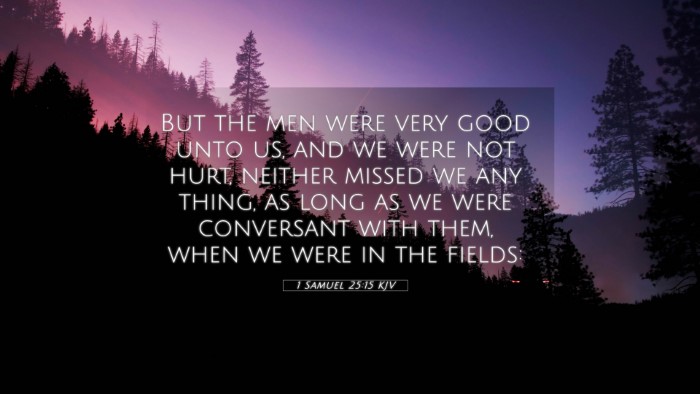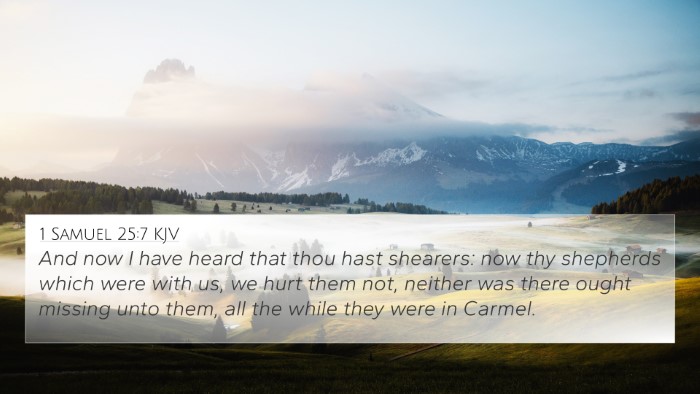Understanding 1 Samuel 25:15
This verse presents a critical moment in David's life and interactions with the household of Nabal. The text states:
“But the men were very good unto us, and we were not hurt, neither missed we anything, as long as we were conversant with them, when we were in the fields.” (1 Samuel 25:15)
Meaning and Interpretation
This verse highlights the protection and good treatment that David and his men received from the shepherds of Nabal. It serves as a reminder of the significance of kindness and hospitality, especially in the context of Israelite culture.
Insights from Commentaries
- Matthew Henry: Henry emphasizes the theme of ingratitude. Despite the good deeds of David and his men, Nabal's later refusal to assist them showcased a lack of recognition for their past actions.
- Albert Barnes: Barnes notes the military context of this narrative, highlighting that David's men acted as protectors to Nabal's flock, thereby tying into larger themes of community and security.
- Adam Clarke: Clarke interprets this verse as demonstrating God’s providence, where David's men are recognized for their contributions, showcasing God's protection over them during hard times.
Key Themes in 1 Samuel 25:15
- Gratitude: The verse illustrates the importance of recognizing and appreciating the help and support received from others.
- Protection: The passage signifies the protective role of David’s men, reflecting their moral obligation to safeguard those in need.
- Community: It highlights the interdependencies within communities in ancient Israel, where tribes and families relied on each other for survival and safety.
Bible Cross-References
To better understand the implications of 1 Samuel 25:15, we can explore several cross-references that relate to its themes:
- Proverbs 11:17: "The merciful man does good for his own soul, but he who is cruel troubles his own flesh." This emphasizes the rewards of kindness similar to David's actions.
- Psalm 37:21: "The wicked borrows and does not repay, but the righteous shows mercy and gives." This passage contrasts David's faithful character with Nabal's later actions.
- Luke 6:31: "And just as you want men to do to you, you also do to them likewise." This reflects the ethical expectation in biblical teaching, applicable in David's scenario.
- Matthew 5:7: "Blessed are the merciful, for they shall obtain mercy." This connects the idea of kindness and mercy from David to the teachings of Jesus.
- Galatians 6:7: "Do not be deceived, God is not mocked; for whatever a man sows, that he will also reap." This reinforces the theme of accountability in actions as seen in Nabal's response to David.
- 2 Samuel 2:7: "Now therefore let your hands be strong, and be valiant; for your master Saul is dead, and also the house of Judah has anointed me king over them." This verse shows David's position and the loyalty he is owed, echoing the kindness he extended to others.
- Romans 12:13: "Distributing to the needs of the saints, given to hospitality." This highlights the New Testament's endorsement of community support, like that David offered.
Connections Between Bible Verses
This verse connects with several other scriptures, painting a broader picture of David's leadership qualities and interpersonal relationships:
- 2 Corinthians 6:14: "Do not be unequally yoked together with unbelievers..."—linking David’s benign association with other households.
- Acts 20:35: "It is more blessed to give than to receive."—extending the theme of mutual support illustrated in the Old Testament.
- 1 Peter 4:9: "Be hospitable to one another without grumbling."—a testament to the enduring value of hospitality in community life.
How to Use Bible Cross-References
Engaging in cross-referencing Bible study can deepen one’s understanding of particular verses. Here are some tools and methods to enhance this study:
- Bible Concordance: Utilizes an index to find scripture where specific words or themes appear.
- Cross-reference Bible Study: Encourages examining similar themes or narratives to generate a comprehensive understanding.
- Inter-Biblical Dialogue: Engages with the relationship between Old and New Testament scriptures to draw thematic parallels.
- Study Guides: Various publications offer structured pathways to explore connections throughout the Bible.
Conclusion
1 Samuel 25:15 serves as a poignant reminder of the themes of gratitude, protection, and communal relationships. By examining this verse through the lens of various commentaries and cross-referencing it with related passages, believers can gain a richer understanding of its implications in their pastoral and everyday lives.





